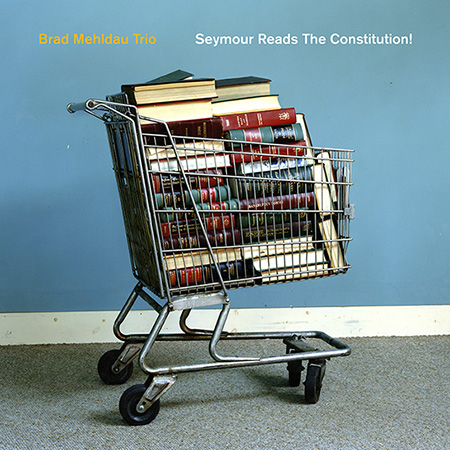Brad Mehldau has shared the story behind the title track to his new Trio album, Seymour Reads The Constitution!, in a new essay. "In 2014, I had a dream that the actor Philip Seymour Hoffman was reading the American Constitution to me," he begins. You can read what he has to say here.
Brad Mehldau shares the story behind his Trio's new album, Seymour Reads The Constitution!, in an essay he first posted to his website:
In 2014, I had a dream that the actor Philip Seymour Hoffman was reading the American Constitution to me. We were in a library in someone's mansion, all oak bookshelves and leather chairs, mahogany furniture, that sort of thing. He read in a measured but slightly melancholic voice, resigned and stoic all at once. Behind his voice was the melody of what became "Seymour Reads the Constitution." When I woke up I grabbed the initial melody before it faded away and wrote the song. I titled it "Seymour Reads…," not using his full name because it was already a long title, and I didn't want to always be saying his name announcing the tune, which would feel corny and gimmicky. So I honored him obliquely up until now.
What happened next was strange and sad. Not even two weeks later, Phillip Seymour Hoffman died. I was shocked and sad like many other folks. I was a big fan of his and admired the honesty and integrity that marked his performances, in roles he played in Boogie Nights, Happiness, Capote, Doubt, and other movies. I felt like he brought true humanity to the characters he played—we could see ourselves in him, reflect, and maybe forgive. His body of work lives on.
Dreams have played a role in my music on different occasions. They are glimpses of an alternate mode of consciousness that is not as cut and dry as one's quotidian awake state. A dream for me is at once a potentially illuminating activity of the mind and also nothing short of a spiritual experience. I may choose to understand it in more "rational", Cartesian terms—I am the dreamer; those are my thoughts; it came from me. Or, I view the dream as something from the outside, so by a "spiritual" experience I mean one that is not governed by my own volition. The dream is a kind of gift; I don't will it. Yet it takes place in my mind. There is thus a dissonance between my usual sense of "I" and the unknown, numinous agency that affords me the dream.
I can reconsider what constitutes consciousness itself, if I am not the sole agent. The division between this "I" and the Absolute/God is not certain. A normative spiritual experience includes initial separation from God, and eventual union. Yet in the act of dreaming, I am not only a mere witness. I must finally allow that I am the agent as well, and have been so all along. Perhaps the same applies to God—I was never separate; that was only one limited type of perception. Who is this "I", though? What else does He/She/It know that I am not privy to in my conscious state? I want to know more, yet I cannot will that knowledge. It's the same as the way the tune came into being in the dream: It's a present.
This "I" who dreams is not as bound to the linear rules of time. Specifically here I mean the ability to roam into the future just a bit. Reading books of prophecy in the Hebrew Bible, like Daniel and Ezekiel, or the writer who called himself John and gave us his Revelation that ends the Christian scriptures, I'm convinced that it was the imaginative power of their dreams that gave their utterances poetic authority to this day. "Imaginative power", "the larger I" or "God" are synonyms for the same source of revelation, just with different orientations.
I'm not sure why Phillip Seymour Hoffman chose to read the American Constitution when he addressed me in my dream, and I can't be sure on any empirical grounds that the dream was prophetic. Yet it feels like that now, which is why I report it. Anyways, prophecy never claimed to operate on empirical evidence, and if it helped a credulous assembly of Christians vote a lying adulterer into office who is now laughing at them, then I say: we can all play the prophecy game.
My prophecy is more subdued than the earlier stuff, less a Hosean cry of condemnation, and more of a whimper, as I suspect that we're all culpable somehow. We're all in it together, come what may. There was that resignation in Seymour Hoffman's voice in my dream, somberness with a tiny trace of irony (a glint in his eye, maybe the beginning of a smile), reading that document. The "I" who is free of time, the greater "I" that is not one person, spoke through him, glimpsing forward from 2014 into the present day.
Contrasts strike me: between his measured oration—the restraint, the quietude, the very faculty of self-reflection—and the babbling daily feed of the old clown we are all subject to now. Between the integrity and vision of that original document, and the empty-headed barrage of today's presidential tweets ... Now it seems to me like Phillip Seymour Hoffman was saying: "Good luck, you guys. I'm gonna sit this one out."
RIP Phillip Seymour Hoffman, exitus scaenam. You got out just in time.
—Brad Mehldau
The days of punishment have come, the days of recompense have come; Israel shall know it.
The prophet is a fool, the man of the spirit is mad,
because of your great iniquity and great hatred.
The prophet is the watchman of Ephraim, the people of my God,
yet a fowler's snare is on all his ways, and hatred in the house of his God.
They have deeply corrupted themselves as in the days of Gibeah:
he will remember their iniquity. He will punish their sins.
Hosea 9.7–9
- Log in to post comments



